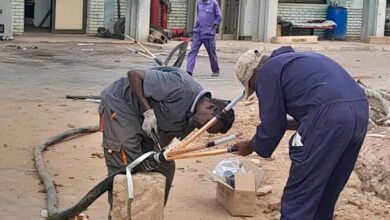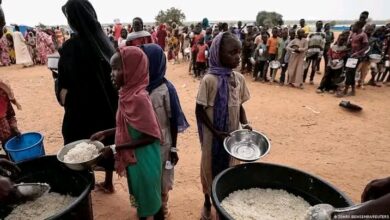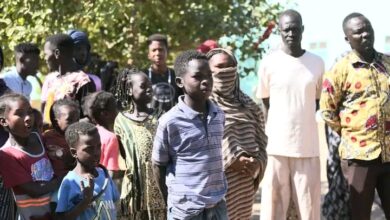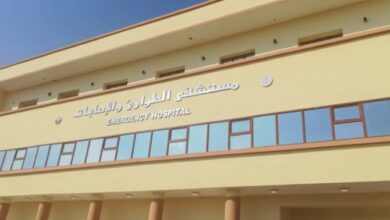Sudanese Artists Create with Inspiration to Confront the Disaster of War
Kordofan – Report by Burai Al-Abnosi
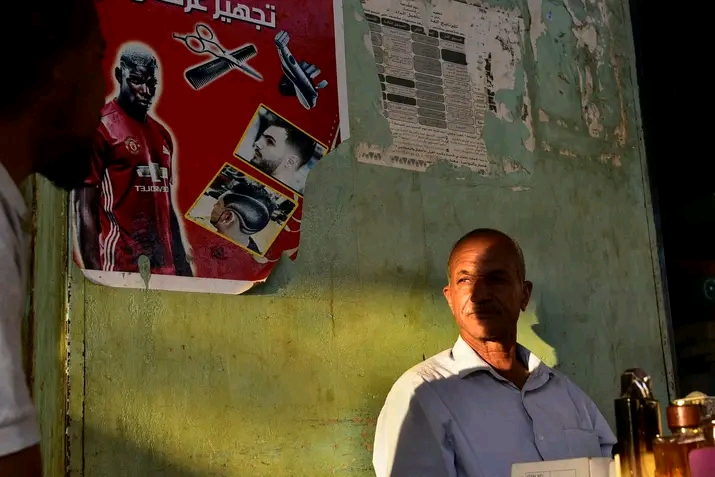
Despite the tragedies of internal displacement and the pain of exile, Sudanese art has played a powerful role in resisting war. Through various creative works—whether painting, music, theatre, poetry, or cinema—artists have revealed the brutal reality of armed conflict and defended human dignity.
Notably, artists in conflict zones have succeeded in transforming their suffering and personal experiences into inspiring artistic expressions that document history from a humanitarian perspective. Their work has helped reconcile warring local communities, promote unity, reject hatred and violence, and foster peaceful coexistence and tolerance—all while contributing to mending the social fabric through diverse forms of art.
Rejecting Violence
Since the outbreak of armed conflict on April 15, 2023, many visual artists have organized exhibitions both inside and outside Sudan to reject violence and call for peace. Theatre professionals have also presented notable works in cities such as Port Sudan, Kosti, Wad Madani, and Atbara, as well as in displacement shelters for Sudanese civilians. Meanwhile, poets and performers have produced numerous impactful pieces.
Resistance and Enlightenment
Playwright Muammer Mohieddin, director of Bashish Center for Performing Arts, told Mashawir:
> “The center has played a crucial role in countering hate speech and promoting peaceful coexistence, both before and after the war. Through performing arts—such as theatre, music, and dance—we work to instill the values of tolerance and peace.”
He added:
> “Our programs have included musical theatre performances that promote national unity and coexistence among Sudan’s diverse social and ethnic groups. These events aimed to challenge and correct harmful stereotypes that fuel hate speech.”
> “Examples include the Bashish Interactive Theatre Festival, the Land Management for Peaceful Coexistence Project in Darfur, and various performances in South Kordofan.”
He continued:
> “We conduct awareness and community engagement programs through artistic events and workshops. The center encourages dialogue between individuals and groups within Sudanese society, helping to reduce polarization and ethnic discrimination.”
> “We’ve spread human values through various artistic forms—promoting tolerance, mutual respect, and understanding. These artistic expressions deliver anti-racist and anti-extremist messages that enhance social harmony.”
Mohieddin emphasized that the center designed specific activities to counter hate speech after the war erupted, a time when such rhetoric became increasingly visible due to political, economic, and security instability.
> “Our mission continues through performing arts that spotlight the impact of violence and hatred, while advocating reconciliation and peacebuilding.”
He added:
> “We’re preparing theatrical works, podcasts, and art tours for Sudanese refugee camps in South Sudan, Kenya, Uganda, and Chad, as well as programs supporting national reconciliation. These artistic efforts aim to heal psychological and social wounds caused by war, rebuild social connections among communities, and create dialogue around identity and reconciliation.”
> “Performances in war-affected areas offer a space for interaction with the public and carry symbolic and emotional significance. The center has played a pivotal role in providing cultural and artistic alternatives that promote peace and tolerance in both pre- and post-conflict periods.”
Influential Roles
In the same context, musician Hossam Abdel Salam highlighted the essential role of art in unifying the nation.
He said:
> “The universe is built on diversity, and this diversity is a beautiful trait and evidence of the greatness of the Creator. He could have created everything identical, but He chose difference.”
> “One of the artist’s core missions is to reveal the beauty of diversity to encourage acceptance of difference, and ultimately, acceptance of others. Even if love is absent, respect must be present.”
He added:
> “Music and song have shaped the emotional identity of the Sudanese people and, at times, unified their collective consciousness through a distinctly Sudanese musical language—fusing styles from all across the country.”
> “People embraced the musical heritage of different ethnic groups, even across language barriers, because the sincerity of the art touched hearts.”
> “Naturally, art plays a vital role in rejecting hate speech. Art is rooted in love. Our pioneering artists have embedded these values into Sudanese culture and handed the keys to future generations—keys like incorporating the melodies, rhythms, vocabulary, and proverbs of various ethnic groups into contemporary artistic works.”
> “Both ancient and recent history testifies to the creative community’s impact in promoting a culture of love and peace.”
Noble Messages
Novelist Amina Al-Fadl believes that:
> “Art plays a major role in rejecting hate speech because it carries noble messages that help overcome prejudice, strengthen emotional awareness, and encourage mutual understanding.”
> “Through its many forms, art creates space for dialogue and cultural exchange—whether through music, theatre, cinema, literature, or visual arts. All these artistic expressions work in one way or another to dismantle hatred in societies, replacing it with love and transforming war into peace.”
Values of Tolerance and Love
Art critic Musab Al-Sawi explained:
> “Art, by nature, advocates for truth, goodness, and beauty. This makes it inherently aligned with the values of tolerance and love. Even the most bitter rivals may unite over a beautiful melody, a poetic line, or a captivating painting. Art speaks to our shared humanity regardless of color, race, or gender.”
He added:
> “Hate speech seeks to divide, while art seeks to unite. Hate fosters hostility and revenge, but art encourages positive and constructive values like forgiveness and unity.”
> “It’s not only art—sports also contribute. In ancient Greek civilization, the Olympic Games brought temporary ceasefires. Even today, during the FIFA World Cup, conflict often pauses.”
Al-Sawi stressed:
> “Art and sport build bridges of connection across Sudan’s diverse ethnic groups. For example, wrestling is originally from the Nuba Mountains, but many others have embraced it. ‘Nagara’ (a traditional drum dance) is associated with a specific tribe but now resonates across all of Greater Kordofan. Music has created a shared emotional identity across groups.”
> “A prime example is the role that Omdurman Radio and its songs played in unifying the Sudanese spirit—songs that made every part of Sudan feel like home, worthy of pride and devotion.

